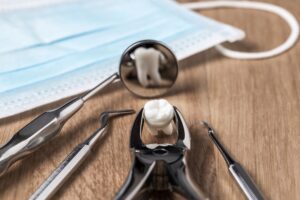
Plenty of people feel anxious about the dentist, especially when they have a significant procedure to contend with, like an extraction. Worrying about having your tooth pulled is natural, especially if it’s not even hurting. Why would it be necessary to remove it when it’s not causing problems?
Although your dentist typically does everything they can to preserve your natural teeth, there are some circumstances in which extracting one is the best way to maintain your dental health. Continue reading to learn more about 3 potential reasons your provider may have recommended it!
Cause #1: Tooth Decay
It’s easy to think that your mouth must be perfectly fine if nothing is hurting. However, according to the CDC, more than one in four American adults has at least one untreated cavity. Caries happen when bacteria in your mouth and acids from your food wear through your enamel. They can develop in places you might not notice, like between teeth, behind your molars, or below the gumline.
Decay can usually be effectively treated if caught early enough, but sometimes, it progresses to the point that the tooth cannot be saved. To make matters worse, cavities are contagious and can spread to neighboring teeth or impact your jawbone. In these instances, removing the troublesome tooth is the best (and sometimes only) way to protect your grin.
Cause #2: Gum Disease
Did you know that periodontal disease is the number one leading cause of tooth loss in adults? Unfortunately, it can also contribute to the need for extraction. If plaque accumulates along your gumline, it can infect the connective tissue and cause it to recede away from your enamel. As it pulls away, it exposes more of the roots of your teeth, leaving them without as firm a foundation. While some patients develop sensitivity during this process, others feel no discomfort or negative sensations. Then, they’re surprised when they learn a tooth might need to be removed and replaced because it’s loose in the socket and can’t be repaired.
Cause #3: Overcrowding
If your teeth are so crowded in your mouth that they overlap or are misaligned, then your dentist might need to remove one or more. Overcrowded teeth are harder to keep clean because it’s difficult to reach all surfaces to thoroughly brush and floss them. Making enough room for them to be shifted back to their rightful places is essential to preserving your oral health. Patients who need braces, dentures, or other types of oral appliances might need to undergo extraction to ensure there’s enough room for everything to fit as intended.
As you can see, there are some circumstances in which a tooth might need to be pulled, even if you’re not in pain. If you’re unsure why your dentist suggested it, the best way to find out is to ask them!
About the Author
Dr. Megan McInnis has 10+ years of experience helping people improve their lives by enhancing their oral well-being. She earned her Doctor of Dental Surgery from Texas A&M Health Science Center Baylor College of Dentistry and is a member of multiple organizations, including the American Dental Association. She takes the time to listen to your needs and concerns and then utilizes state-of-the-art technology to provide fully individualized treatments to help you address them. If you’re worried about a troublesome tooth, you can request an appointment on the website or call (503) 761-1414.




